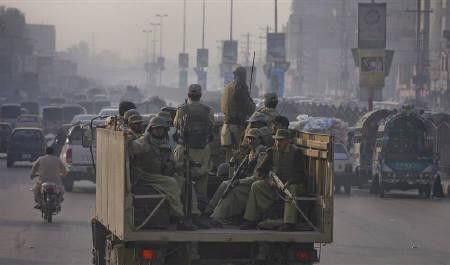Pakistani Media Warn of Showdown Between Military and President

(Reuters) - Pakistan's powerful military and civilian leaders are headed for a showdown over a memo that accused the country's generals of plotting a coup, newspaper editorials predicted Friday.
A specter is haunting Pakistan -- the specter of a clash between the army and the government that threatens to turn fatal, said an editorial entitled Point of no return? in the News.
Army chief General Ashfaq Kayani has called for an investigation into the memo's origins, which could further undermine deeply unpopular President Asif Ali Zardari.
The Supreme Court is looking into a petition demanding an inquiry into the matter.
Businessman Mansoor Ijaz, writing in a column in the Financial Times on Oct. 10, said a senior Pakistani diplomat had asked that a memo be delivered to the Pentagon with a plea for U.S. help to stave off a military coup in the days after the raid that killed Osama bin Laden in May.
Ijaz later identified the diplomat as Pakistan's ambassador to Washington, Husain Haqqani, who denied involvement but resigned over the controversy.
The military faced unprecedented public criticism over the bin Laden affair, widely seen as a violation of sovereignty.
But many Pakistanis rallied around the army after a Nov. 26 air attack by NATO forces in Afghanistan killed 24 Pakistani soldiers on the border. The memo has also helped boost the army's image at the expense of the government.
What has become known as memogate has made Zardari, who is close to Haqqani, more vulnerable than ever since taking office in 2008 in a country where anti-U.S. feeling runs high.
His government, heavily reliant on foreign financial help, has failed to tackle myriad problems, from crippling power cuts, to suicide bombings, to a struggling economy.
The army is fed up with Zardari and wants him out of office, although through legal means and without a repeat of the coups that are a hallmark of the country's 64 years of independence, military sources told Reuters on Thursday.
The breach between the army and the government appears to have widened to dangerous levels, said Dawn, one of the country's most respected newspapers.
While even at this stage it is premature to assert that extra-constitutional means of removing the government are in the works, it would nevertheless be useful to recall that the army has usurped power four times in Pakistan's history to 'save the nation'.
ARBITER OF POWER
Friction between Pakistan's civilian government and military have bedeviled the nuclear-armed country for almost its entire existence, with the military ruling for more than half its 64-year history.
Any coup -- Pakistan has had four since independence in 1947 -- could further tarnish the military's image which has already taken a battering after the bin Laden operation, widely seen in Pakistan as a violation of sovereignty.
But the army remains the arbiter of power and analysts say it has plenty of ways to pressure Zardari to step down, especially if a link is established between him and the memo, which sought the Pentagon's help in averting a feared coup.
In the past the army has asked Pakistani civilian leaders to resign and influenced judicial proceedings against them.
On Thursday, Prime Minister Yusuf Raza Gilani told parliament that any institution acting as a state within a state was unacceptable, in a clear reference to the military.
He also praised the army in what The Express Tribune described as an attempt by him to assuage the powerful institution, while at the same time clearly saying that whatever is happening will not be taken lying down.
Zardari returned to Pakistan this week from medical treatment in Dubai that raised speculation he would resign under pressure from the military.
Although his position is largely ceremonial, he wields considerable influence as leader of the ruling party and his forced departure would be a humiliation for the civilian leadership and could throw the country into turmoil.
Zardari is the widower of former premier Benazir Bhutto, who spent years opposing military rule. She was assassinated in 2007.
Pakistan's next parliamentary elections are not due until 2013 although some opposition parties have been calling for early polls. Presidents are elected by legislators.
Summing up Pakistan's realities since its creation, the Daily Times said:
No one can disagree with the principle of civilian supremacy but Pakistan's history is witness to how the military holds it in utter contempt and considers itself not to be subservient to the elected representatives.
(Writing by Michael Georgy; Editing by Robert Birsel)
© Copyright Thomson Reuters {{Year}}. All rights reserved.



















